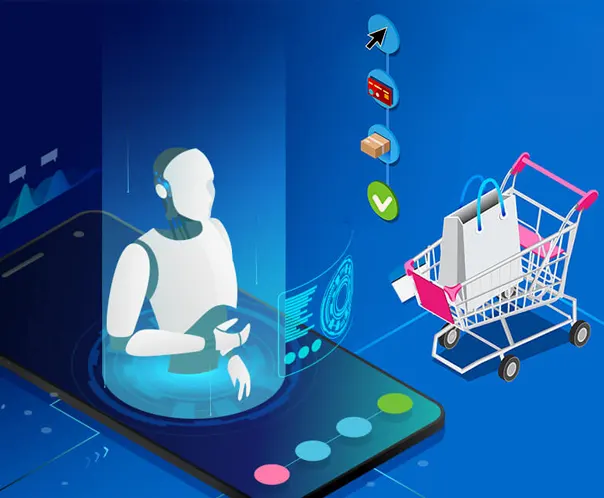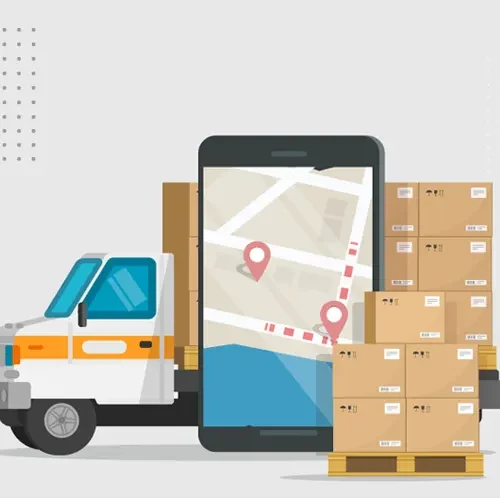Can you believe that just a few years ago, you couldn’t purchase anything online and have it delivered straight to your doorstep? The only option for shopping was to head out to your local stores or malls and wait in line. Thanks to modern technology, everything has changed for the better. The transformation from the traditional brick-and-mortar stores days of trudging to area shops or bustling malls to the modern era of online shopping has been nothing short of revolutionary.
Thanks to modern technology, particularly AI technology, purchasing goods online has become a whiff. No more queues, no more hassles—just the translucent convenience of shopping from the warmth of your couch, with an AI shopping assistant at your flow by using mobile apps.
The significant shift from physical stores to AI-based shopping apps or online eCommerce apps is just a blip on the business radar. The integration of AI into E-commerce apps has revolutionized the way we purchase items.
Artificial Intelligence, or AI, has revolutionized the way we shop. With the help of AI
shopping apps, you can now browse and buy items online at your convenience, avoiding those dreaded queues and saving time. It’s a game-changer, wouldn’t you agree?
Switching from a traditional brick-and-mortar store to an e-commerce app used to be considered a significant change in the business model. But now, with the power of AI in e-commerce apps, the entire shopping experience has been transformed. It’s not just about the convenience of buying online anymore; it’s about the personalized assistance and seamless browsing experience that AI brings to the table.
In fact, according to eMarketer, global retail e-commerce sales surpassed $5 trillion in 2022, accounting for more than one-fifth of total retail sales. And get this – it’s projected to exceed a staggering $7 trillion by 2025. And you know what’s playing a big role in driving this growth? You guessed it, AI.
Businesses across various industries have recognized the potential of AI and are integrating eCommerce shops into their operations. From improving business processes and enhancing cybersecurity to providing personalized customer experiences and optimizing inventory management, AI has become a vital tool. It’s no surprise that AI is the flavor of the year in the world of e-commerce apps.
AI-Based Shopping App – Impactful Transition of Technology!
According to a survey by Forbes Advisor, businesses are using AI tools in different ways. Some use it to improve and perfect their operations, while others rely on AI for cybersecurity and fraud management. Digital personal assistants powered by AI are also gaining popularity, helping businesses with customer relationship management and providing a more seamless shopping experience.
And it doesn’t stop there. AI is being used for inventory management, content production, product recommendations, accounting assistance, and even recruitment and talent sourcing. Its potential seems limitless.
The AI app sector itself has already generated a whopping $2.5 billion in 2022. And brace yourself – it’s projected to grow at a compound annual growth rate of 38.3% until 2028. That’s massive, right?
But not every business has fully embraced AI yet. While some are aggressively integrating AI across various aspects of their operations, AI-Based Shopping Apps are gaining significant popularity and there are still quite a few businesses in the exploration phase, figuring out how AI can fit into their workflows.
Global AI is transforming industries landscape:
According to a recent survey conducted by Forbes Advisor, businesses are using AI tools in various ways. Let’s take a closer look at the insights shared by the study:
Improving Business Operations:
More than half of the businesses surveyed (56%) are using AI to enhance and streamline their operations. AI technologies help optimize processes, automate repetitive tasks, and improve overall efficiency.
Cybersecurity and Fraud Management:
Given the increasing sophistication of cyber threats, 51% of businesses are turning to AI to bolster their cybersecurity measures. AI algorithms can identify patterns and anomalies, detect potential threats, and mitigate risks.
Digital Personal Assistants:
AI-powered digital personal assistants are gaining popularity, with 47% of businesses harnessing these tools. These assistants provide personalized assistance to customers, improving the overall shopping experience and boosting customer satisfaction.
Customer Relationship Management:
AI is being used by 46% of businesses to enhance customer relationship management (CRM). AI algorithms analyze customer data, enabling businesses to provide personalized recommendations, offers, and support.
Inventory Management:
AI is playing a significant role in inventory management, with 40% of businesses using AI tools. By analyzing historical data and market trends, AI algorithms help optimize inventory levels, reduce costs, and minimize stockouts.
Content
Production:
As content creation becomes increasingly important in digital marketing, 35% of businesses are leveraging AI for content production. AI tools can generate content, proofread, and even improve writing style, saving time and enhancing quality.
Product Recommendations:
AI algorithms are employed by 33% of businesses to provide personalized product recommendations to customers. Through the analysis of customer preferences and behavior, AI can recommend relevant products, boosting sales and engaging customers.
Accounting Assistance and Supply Chain Operations:
30% of businesses are utilizing AI for accounting assistance and supply chain operations. AI tools can automate financial processes, perform predictive analysis, and optimize supply chain logistics.
Recruitment and Talent Sourcing:
AI is being leveraged by 26% of businesses for recruitment and talent-sourcing purposes. AI-powered tools can analyze resumes, screen candidates, and identify potential matches, saving time and improving the hiring process.
Audience Segmentation:
24% of businesses are using AI tools for audience segmentation. AI algorithms analyze customer data to identify distinct segments and tailor marketing campaigns accordingly, increasing the effectiveness of targeted messaging.
The reflected growth of the AI app sector!
In 2022, this sector generated $2.5 billion in revenue, and it is projected to grow at a compound annual growth rate of 38.3% until 2028. This growth serves as a testament to the increasing adoption and recognition of the value that AI brings to businesses.
While some businesses are aggressively integrating AI into their operations (22%), others are taking a more cautious approach, engaging in limited implementation (33%).
However, a significant portion of businesses is still in the exploration phase (45%), showing that there is a wealth of untapped potential for AI in various industries.
What Is an AI-Based Shopping App?
AI is making waves in the world of shopping among B2B and B2C customers and its impact is nothing short of transformative. Picture this: you’re browsing through an online store, and like magic, the AI-Based Shopping Apps start suggesting personalized recommendations that align perfectly with your taste. That’s the power of AI-based shopping apps at work.
These innovative AI-based eCommerce apps are reshaping the customer experience, making transactions smoother and more efficient by adding a deeply personal touch. And that personal touch is crucial because it’s what keeps customers coming back and turning into loyal fans of your business.
When we talk about AI-based shopping apps, we’re diving into the territories of retail, eCommerce, and fashion – all spaces where technology is being leveraged to revolutionize the shopping journey. Think of AI as your savvy try-on shopping assistant, learning your preferences and guiding you toward products that you’re likely to adore.
For B2C eCommerce brands, the opportunities that AI presents are nothing short of exciting. If you receive tailored shopping recommendations based on your browsing and purchasing habits, it feels like having a knowledgeable friend who knows your style inside out and suggests items that truly resonate with you.
Can AI-based shopping apps even offer virtual try-ons usage?
Yes, you can virtually try on that snazzy pair of sunglasses or that fresh new outfit using augmented reality, all from the comfort of your device. It’s a game-changer, providing a whole new level of convenience and confidence in your purchasing decisions.
AI-based shopping apps are being utilized for all businesses, big and small. For B2B companies, these AI-based shopping apps bring opportunities to forecast product demand, optimize inventory management, and streamline supply chain operations. It’s all about harnessing the power of AI to make data-driven decisions and enhance overall efficiency.
Exploring the Types of AI-Based eCommerce Apps: Enhancing Online Shopping Experiences With AI!
AI-powered eCommerce apps are built for better ways for customers to interact in online mode, offering personalized experiences and streamlining transactions.
Reactive AI-Based Shopping App:
Reactive AI is none other than conversational bot integration in AI-based eCommerce apps. It reacts to specific inputs with pre-programmed actions, providing quick responses and assistance to customer queries.
In addition, chatbots and AI shopping assistants utilize reactive AI to deliver instant product information, suggest product items based on their previous buying patterns, answer customer questions, and assist with basic suggestions. This type of AI enhances customer service and reduces response times, ultimately improving customer satisfaction.
For Example: “Hi, I’m looking for a new pair of running shoes. Can you recommend a brand?”
Reactive AI Response: “Sure! Based on your preference for running shoes, I recommend checking out our XYZ brand. They offer great support and comfort for long-distance running.”
Machine Learning AI:
Machine learning AI, also known as limited memory AI, reacts to past data and actions. It can personalize and improve the customer journey by forecasting customer behavior and creating engagement. AI-powered eCommerce apps leveraging collected customer data, machine learning AI helps deliver targeted recommendations and promotions, maximizing the chances of conversions.
For Example: the ML algorithm reacts based on your previous purchases and browsing history. It has curated a selection of products you may be interested in.
Machine Learning AI Response: “Here are some running shorts and hydration belts that match your previous purchases. Enjoy exploring!”
Theory of Mind AI
Theory of mind AI aims to replicate human-like communication and understanding. By embodying shoppers’ emotions, beliefs, and intentions, this type of AI enables more sophisticated and intuitive interactions. It can enhance conversational commerce and build deeper connections with customers.
For Example: “I’m attending a wedding this weekend. Can you suggest some formal dresses?”
Theory of Mind AI Response: “I understand the importance of finding the perfect dress for a special occasion. Let me recommend a few elegant and stylish options that will suit the wedding theme.”
Self-Aware AI:
Self-aware AI represents an advanced stage of AI, reacting based on systems that possess sensibility and adaptability. Although self-aware AI is still a concept in eCommerce, it holds the potential to transform the industry. With self-aware AI, systems can independently learn, adapt to the environment, and provide increasingly insightful recommendations over time.
For Example Currently speculative Self-Aware AI Recommendation: “Based on your personal style preferences and recent fashion trends, this dress from our new collection would be a great fit for your upcoming event. It pairs well with the heels you purchased last month.”
We also think the eCommerce AI app should have MetaVerse store Integration!
In addition to AI capabilities, incorporating technologies like augmented reality (AR) and virtual reality (VR) into eCommerce apps can further revolutionize shopping experiences.
Creating immersive metaverse environments allows customers to interact with products and services in innovative ways, trying on virtual clothing or visualizing furniture in their homes.
This technology offers exciting possibilities for the future of eCommerce, providing unparalleled convenience and engagement.
According to Gartner research, by 2030, over a quarter of consumers will dedicate at least an hour per day to the metaverse. This is a unique chance for businesses to connect with their consumers and venture into uncharted territory.
Wrapping up
As AI continues reshaping, our thought process to behaviors in purchases too. Does our business process need to be checked? Yes, companies must explore AI networks and see how they can benefit from their specific industries and needs. The ideal solution for prompt responses is provided by these AI-Based Shopping Apps. The Best Mobile App Development Agency can be efficient and help you develop these AI-based eCommerce Apps for an immersive Online Shopping experience. So, whether you’re a business owner or a savvy shopper, keep an eye out for the power of AI in eCommerce apps. Online Shopping App Development service going to make your eCommerce shop easier and revolutionize our shopping patterns.




